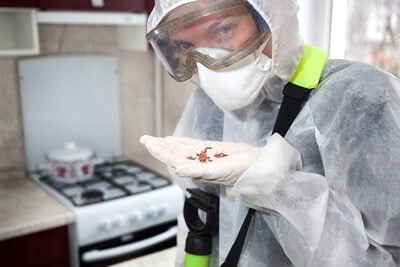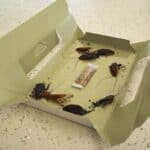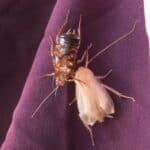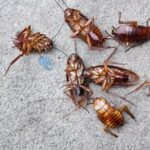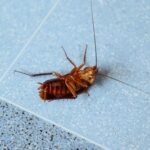Cockroaches breed quickly and develop large colonies. Spraying cockroaches with pesticides kills them, but you may be surprised to discover more cockroaches coming out a few days after treatment.
Treatment doesn’t kill cockroaches instantly, and it’s normal to see more cockroaches than usual. Once a cockroach comes into contact with the treatment, it carries the poison back to its nest and spreads it to other cockroaches. This stirs the hiding cockroaches into action for a few days before they die off at a later date.
However, cockroaches are gradually becoming immune to pesticides and insecticides. So, you may have to combine it with other solutions, such as keeping your living space clean and using cockroach traps to finish the job. However, you should give the treatment sufficient time to work before writing it off as a failure.
Is It Normal to See Cockroaches After Extermination?
You should expect to see cockroaches moving around for a few days after extermination. This will even be the case during the daytime, even though cockroaches are nocturnal. This is because they will be:
- Jarred by the experience and acting impulsively
- Driven out of their normal habitat by the poison and forced to wander in search of new territory
- Hungry once their original food sources are cut off and scavenging for new meals
Depending on the pest control method used, cockroaches may appear immediately or after a few days. However, the sprayed cockroaches may not come out from their nest at all because they’re:
- Already dead or died quickly
- Resistant to pesticide
According to the Florida Entomologist, cockroaches are developing an immunity to certain pesticides. If a previous generation has been exposed to the poison you use, the next one may be able to resist it.
With this in mind, you should investigate whether the cockroaches are dead or you need to use a different pesticide. You should only reapply the chemicals after 2 weeks to give the first treatment time to work.
It is Okay To See More Roaches After Placing Bait Stations?
After setting up a bait station in your home, you will likely see more cockroaches coming out. Cockroach bait stations consist of a slow-acting liquid toxicant mixed with a food source.
This special formulation works by attracting cockroaches to the bait station due to its sweet-smelling aroma. For this reason, you’ll see hungry cockroaches congregating near the bait station.
Since cockroaches feed on almost anything, they’ll eat the laced food and return to their nests. As they do, they’ll excrete feces and urine. Other cockroaches will ingest these feces and urine and die as a result.
These insecticides often require weeks to work effectively. Because of that, you may find that a cockroach infestation gets worse before it gets better.
Why Are There More Cockroaches After Pest Control?
The cockroaches in your home don’t miraculously multiply overnight after pest control. The ones that you’re seeing were in your home in the first place. They are now coming out due to the negative effects of the pesticide.
After pest control measures, you’ll see more cockroaches coming out even during the day. You’ll notice the cockroaches moving sluggishly as if they’re dying. The number of dead cockroaches should increase as the days go by.
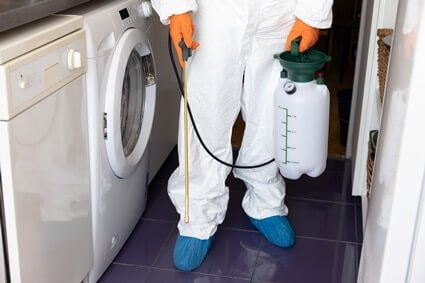
Can Cockroaches Survive After Being Sprayed?
Insecticides consist of neurotoxic compounds that produce a “knockdown effect.” This happens when a cockroach ingests the chemical or absorbs it through the skin. The chances of surviving this knockdown effect are small. Nevertheless, you have to consider the insecticide in question as some are more effective than others.
According to Economic Entomology, insecticides that contain diazinon and bendiocarb were ineffective in controlling cockroaches in apartments. These cockroaches were 14 times and 3.4 times resistant to sprays that contained diazinon and bendiocarb, respectively.
Check the packaging to find out what the formulation uses as its active neurotoxic substance. According to the Agency for Toxic Substances And Disease Registry, insecticides with diazinon and bendiocarb have low efficacy and are dangerous to human health. For these reasons, you should opt for safer alternatives, such as:
- Alphacypermethrin
- Cyphenothrin
- Dioxacarn
- Jodfenphos
Roaches Worse After Spraying
An infestation may appear to worsen after spraying your home. You’ll begin to notice more cockroaches crawling around your living spaces. However, the fact that you see more cockroaches after spraying means that the pest control treatment is actually working.
As discussed, it takes time before the chemicals work. The treatment will force the cockroaches to come out of their nests and hiding places even during the day when you least expect them to appear.
Cockroaches crawling about during the daytime may make it seem as if the infestation is getting worse. However, it just proves how desperate and sick the cockroaches are becoming as they’ve come out of hiding.
Why Am I Seeing More Roaches After Spraying?
You may see more cockroaches because you’ve missed some problem areas when spraying. If they can escape to new places to hide, feed, and breed, they will do so. That’s why it’s important to focus on places that are:
- Between cracks and crevices in walls
- Along heating ducts and air conditioners
- Behind cupboards and refrigerators
- Beneath electric appliances and devices
Most insecticides don’t kill cockroach eggs. A female cockroach can lay up to 200 eggs in her lifetime. No amount of spray can destroy the eggs once they are laid. This allows them to hatch safely later.
The eggs are inside a sack (ootheca) that protects them from harm until they hatch. The eggs will take about 45 days to hatch, and this will be long after the treatment has lost its potency.
The most effective way to deal with cockroach nymphs is to use residual insecticide spray. Nymphs will die once they come into contact with the traces. You can also use cockroach bait, diatomaceous earth, or boric acid.
Do Roaches Come Back After Extermination?.
Cockroach control goes beyond using pesticides and insecticides. You may enlist the best exterminators or use the most effective treatments but still notice cockroaches in your home. Here’s what to do:
Keep Your Home Clean
Sanitation is the first line of defense against cockroaches. You should keep your home clean by vacuuming and mopping surfaces regularly. Never leave the dishes unwashed, and always keep leftover food in airtight containers. Also, clean your yard and remove any organic matter that is of no use.
Dry Wet And Damp Areas
Cockroaches cannot survive for more than 1 week without water. Some roach species, such as Oriental cockroaches, prefer living in dark and moist areas, such as:
- Under leaf piles
- In basements
- Along water pipes
So, dry all wet and damp areas and fix any leakages.
Reduce Accessibility To Your Home
Seal all openings and close gaps between window frames and doors to reduce accessibility. Check any laundry, furniture, and groceries entering your home. Some cockroaches may hide underneath these items.
Secure Rubbish Bins And Empty Them Regularly
Cockroaches usually reside under trash cans, where there is plenty of decaying food, organic matter, and stagnant water. Make sure that your trash is secure and avoid overflowing to keep roaches at bay. Also, make sure that you empty the cans regularly to prevent cockroaches from congregating nearby.
Apply Diatomaceous Earth
A proven natural pesticide is diatomaceous earth. This fossilized earth comes in powder form, and it’s highly toxic to insects with an external skeleton, including cockroaches. To use it, you only need to apply some in areas where cockroaches like to frequent.
What to Do Before Pest Control Treatment for Cockroaches
To ensure the treatment is effective, you need to prepare your home in advance. This will ensure the cockroaches don’t come back or seem to get worse after the spraying is finished.
Clean Your Home Prior To Treatment
In the days before treatment, clean your home and dry all damp areas. This eliminates all food sources that may attract cockroaches. Better yet, it forces them to opt for the bait formulation instead.
Remove Small Appliances And Items From Countertops
Remove small items and appliances from the countertops. Move them to an open space where cockroaches can’t hide. Prepare appliances like microwaves, toasters, and coffee makers for inspection and treatment as needed.
Vacuum Carpeted Floors
Cleaning your home should also include vacuuming carpeted floors and surfaces. This will eliminate any cockroaches and their eggs hidden between the carpet fibers.
Create Easy Access By Moving Furniture
Whether you are enlisting the services of a professional exterminator or doing it yourself, make your home easily accessible. Start by moving large pieces of furniture and appliances to protect them from spills. This also makes it easier to reach areas where cockroaches are hiding.
Cover Baby Toys And Other Supplies
Keep baby toys, changing tables, crib mattresses, and other supplies away in a safe box to avoid contamination. You can also cover them with impermeable, non-porous materials before storing them away.
Dispose of Any Garbage Before Extermination
Empty your trash cans before extermination. If this isn’t possible, consider using closed containers with tight lids. This will prevent scampering cockroaches from finding a new hiding place.
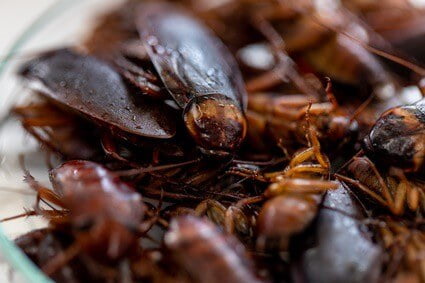
How Long Does Pest Control Take To Work?
You should expect to see more cockroaches in the days or even weeks after treatment. Of course, this depends on the strength and effectiveness of the insecticides used.
Cockroaches are resilient pests, capable of withstanding treatment for many days. Likewise, most insecticides and pesticides are slow-acting. It will take several days before you start seeing lots of dead cockroaches in your home.
Don’t spray or fumigate your space after treatment since this could reduce the effectiveness of the chemicals used. Also, avoid the treated area for about an hour to allow the spray to work.
Ensure that any food that was left uncovered during treatment is disposed of immediately. It doesn’t matter if you’ve chosen organic chemicals.
Can I Vacuum After Pest Control?
Don’t vacuum immediately after treatment because this will adversely affect the results. Consider vacuuming before treatment to avoid interfering with the chemicals.
Wait for about 2 weeks before resuming your vacuuming duties. If you must clean during the waiting period, leave about an inch around the skirting boards so that you’re not removing any of the chemicals.
Can I Bug Bomb My Home After Pest Control?
Bug bombing or fogging is the use of aerosol propellants and insecticides to eliminate pests from your home. Some people prefer using this method along with the usual extermination methods to deal with cockroach problems.
However, this strategy doesn’t work. Bug bombs can interfere with the applied insecticides and render them ineffective. Besides, bug bombs are flammable and dangerous. They can even leave a big mess without killing all the cockroaches. Any cockroaches that are hiding will be unaffected.
How Fast Do Roaches Go Away After Extermination?
It takes about 1-2 weeks for cockroaches to die after treatment. However, this depends on the severity of the infestation and the type of chemical used. You’ll notice more cockroaches crawling in your space a few days after treatment. However, they’ll start diminishing in number as the days go by.
In case of botched treatment, you may have to repeat the process and opt for an alternative insecticide. Heavy infestations may require more than one extermination session, coupled with ongoing management.
